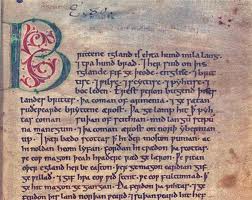 I’m willing to bet that you’ve never spent an afternoon curled up with the Anglo-Saxon Chronicle. Right? This is not surprising because the ASC is not an easy read. For starters, it’s not just one chronicle, but several, written in several places in England over a period of about three hundred years. It was written in Old English, so unless you have a translation you wouldn’t be able to understand much, although you might be surprised by the number of familiar words that pop out at you here and there. Besides that, the names of the individuals who appear in its pages are tongue-twisting: Cynewulf, Ecgbryht, Ceawlin. Yikes!
I’m willing to bet that you’ve never spent an afternoon curled up with the Anglo-Saxon Chronicle. Right? This is not surprising because the ASC is not an easy read. For starters, it’s not just one chronicle, but several, written in several places in England over a period of about three hundred years. It was written in Old English, so unless you have a translation you wouldn’t be able to understand much, although you might be surprised by the number of familiar words that pop out at you here and there. Besides that, the names of the individuals who appear in its pages are tongue-twisting: Cynewulf, Ecgbryht, Ceawlin. Yikes!
 When did the chronicling begin? Some time in the 9th century Alfred the Great decided that it would be a good thing to make a record of events occurring in what was then the Kingdom of Wessex, so he commissioned a group of monks to write a chronicle. The monks were ambitious, and they started in the year 1, referring to the Bible and to Bede’s Ecclesiastical History for their ancient history. They brought their Chronicle up to date, made several copies of it, and Alfred saw to it that copies were sent to other monasteries on the island of Britain with instructions to keep it up to date. Over the next few centuries, chroniclers in at least four different places added posts, not always annually. One wonders if a particular monk was given the job and, once in a while, he just didn’t get around to it. Sometimes the entries are terse references to ecclesiastical events, sometimes they are poems, sometimes they are long, long descriptions of battles, burnings and even extended quotes from the lips of Saxon kings.
When did the chronicling begin? Some time in the 9th century Alfred the Great decided that it would be a good thing to make a record of events occurring in what was then the Kingdom of Wessex, so he commissioned a group of monks to write a chronicle. The monks were ambitious, and they started in the year 1, referring to the Bible and to Bede’s Ecclesiastical History for their ancient history. They brought their Chronicle up to date, made several copies of it, and Alfred saw to it that copies were sent to other monasteries on the island of Britain with instructions to keep it up to date. Over the next few centuries, chroniclers in at least four different places added posts, not always annually. One wonders if a particular monk was given the job and, once in a while, he just didn’t get around to it. Sometimes the entries are terse references to ecclesiastical events, sometimes they are poems, sometimes they are long, long descriptions of battles, burnings and even extended quotes from the lips of Saxon kings.
 What intrigues and infuriates me the most about the ASC are the details that it does not give. It’s the lacuna, the missing stories behind the stories, that raise questions in my mind. Consider the following tantalizing entries:
What intrigues and infuriates me the most about the ASC are the details that it does not give. It’s the lacuna, the missing stories behind the stories, that raise questions in my mind. Consider the following tantalizing entries:
697 – The Mercians killed Osthryth, Aethelred’s Queen.
Since Aethelred was king of the Mercians, why did the Mercians murder their queen? The murder of a queen strikes me as a very big deal, yet the chronicler had no more to say about it. Why?
933 – The atheling Edward was drowned at sea.
Edward was the brother of the king. How old was he? Where was he going? Did everyone on the ship drown, or just the aetheling? Was there a storm or did the ship strike a rock? There is far more to this story than just this bald statement in the ASC.
942 – Olaf stormed Tamworth, and many dead fell on either hand; the Danes had the victory. They took much booty away with them, and Wulfrun was taken captive in that raid.
 Wulfrun was a wealthy woman. What happened to her after she was taken captive? Was a ransom paid? Was she harmed? Raped? Did she ever get back home?
Wulfrun was a wealthy woman. What happened to her after she was taken captive? Was a ransom paid? Was she harmed? Raped? Did she ever get back home?
946 – King Edmund passed away on St. Augustine’s Day; he had reigned six and a half years. It was widely known how he ended his days, that Liofa stabbed him at Pucklechurch.
In 946 the circumstances around the death of the King of Wessex (England wasn’t united yet) may have been common knowledge, but today I want to know who Liofa was, what happened to him, why he killed the king and how he managed to get close enough to stab him, never mind that Pucklechurch sounds like a name straight out of The Hobbit. Who wouldn’t want to write a complete account of what happened there?
977 – In this year all the most senior counselors of the English fell at Calne from an upper floor, except the holy archbishop Dunstan, who alone stood upon a beam; and some were very badly injured, and some did not come through it with their lives.
Surely the Anglo-Saxon monks saw this as an Act of God…that only the saintly Archbishop would remain standing high above the wreckage of – what? Poor construction? An earthquake? Had they been pounding their feet in rhythm for some reason, like fans at a football game so that vibrations caused the floor to collapse?
The Anglo-Saxon Chronicle: England’s history as it happened.
Sort of.
Mind the gaps.